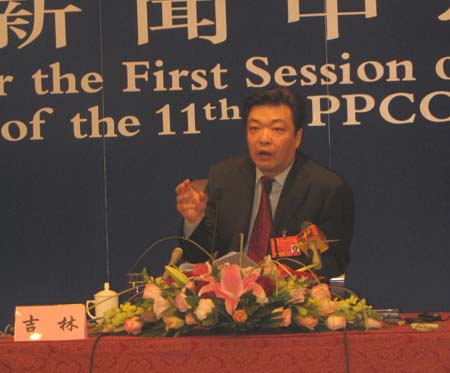"The host city's smooth operation is of vital importance to the success of the Olympic Games. The Beijing municipal government attaches great importance to this work and we have mapped out a nine-point plan to ensure the smooth running of this great event," said Mr. Ji Lin, Vice Mayor of Beijing, on the sidelines of the 11th National People's Congress.

Ji Lin
According to Beijing's construction plan, the Olympic Games will have 31 competition venues, 45 training centers and six related facilities. "As of today, all the venues are complete except for the National Stadium, the National Convention Center, the Olympic Village, the Main Media Village and the Multifunctional Studio Tower," said the vice mayor. "All six venues are expected to complete before May, following which some of them will hold test events and make further improvements." The National Stadium, better known as the 'Bird's Nest', is currently undergoing some modifications connected with the opening and closing ceremonies.
During the Olympic period, Beijing will designate one lane on highways as a special Olympic lane. The partial ban on private cars and business cars, seen during the China-Africa Forum and other events, will be re-applied. "The Olympic Games is a huge social event. It is unlikely that the public will escape all inconvenience. But we are trying our best to reduce the impact." In the past few years, the Beijing government has made great efforts to promote public transport, particularly by expanding the metro system. Last year, Metro Line 5, which traverses the downtown area from north to south, was put into operation. The construction of Line 10 is now in full swing. It is scheduled to open to the public in June. These lines, along with the special Olympic line and airport line, will combine to form a convenient underground transportation network for city commuters.
Beijing's air quality is hotly debated. But the city has seen improvement for nine years on the run. Long before the Olympics, Beijing began working with its neighbors, such as Tianjin, Hebei and Shanxi, to curb pollution and protect the environment. The city has raised the standards applying to the gas exhaust of cars. All large boilers in the city proper now run on clean energy instead of coal. Production at some highly polluting enterprises, such as Shougang's steel plant, has been temporarily suspended. In the old city area, coal-fired stoves have largely been replaced by electric heaters.
Food safety is another concern for the government. "We drew up an Olympic food safety plan years ago. We saw it as an opportunity to improve the city's entire food market," said Mr. Ji. Today, a system is in place to trace food through the entire distribution chain. From farmland to dining table, food supplied to the athletes is monitored at every stage.
During the Olympics, Beijing is expected to see a massive influx of tourists and spectators. Under such a circumstance, sound administration is key to the smooth running of the event. "A special command organization will be established. The Mayor of Beijing will serve as the general director and the vice-mayors will supervise particular work. For example, my everyday responsibility is to ensure city operation. During the Games, I will be in charge of power generation, energy supply and other related issues."
During the interview, Mr. Ji also commented on other measures regarding energy supply, greeting and hospitality services, the city environment, and emergency response capabilities.
(China.org.cn by staff reporter Chen Xia, March 17, 2008)